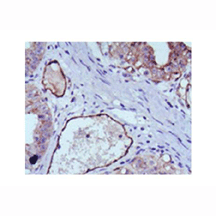Anti-eNOS: Mouse endothelial Nitric Oxide Synthase Antibody |
 |
BACKGROUND Endothelial Nitric Oxide Synthase (eNOS), also called NOS3, along with inducible Nitric Oxide Synthase (iNOS) and neuronal Nitric Oxide Synthase (nNOS), catalyze the generation of Nitric Oxide (NO) and L-citrulline from L-arginine and molecular oxygen. NO is a reactive free radical which acts as a biologic mediator in several processes, including neurotransmission and antimicrobial and antitumoral activities. NO also is implicated in vascular smooth muscle relaxation through a cGMP-mediated signal transduction pathway and mediates vascular endothelial growth factor (VEGF)-induced angiogenesis in coronary vessels, and promotes blood clotting through the activation of platelets.1
eNOS is activated at concentrations of calcium greater than 100 nM and requires tetrahydrobiopterin, flavin adenine dinucleotide, flavin mononucleotide and NADPH for catalytic activity. eNOS is tightly regulated by co- and post-translational lipid modifications, phosphorylation by Akt/PKB, PKA and AMPK and protein-protein interactions.2 Negative protein-protein interactions are mediated by Hsp90 and Cav-1 in the Golgi and by NOSIP and NOSTRIN at the plasma membrane, whilst dynamin, porin and soluble guanylyl cyclase are positive regulators of eNOS activity. eNOS is a critical mediator of cardiovascular homeostasis through regulation of the diameter of blood vessels and maintenance of an antiproliferative and antiapoptotic environment in the vasculature.3 The human gene encoding eNOS is localized to chromosome 7q36.
eNOS is activated at concentrations of calcium greater than 100 nM and requires tetrahydrobiopterin, flavin adenine dinucleotide, flavin mononucleotide and NADPH for catalytic activity. eNOS is tightly regulated by co- and post-translational lipid modifications, phosphorylation by Akt/PKB, PKA and AMPK and protein-protein interactions.2 Negative protein-protein interactions are mediated by Hsp90 and Cav-1 in the Golgi and by NOSIP and NOSTRIN at the plasma membrane, whilst dynamin, porin and soluble guanylyl cyclase are positive regulators of eNOS activity. eNOS is a critical mediator of cardiovascular homeostasis through regulation of the diameter of blood vessels and maintenance of an antiproliferative and antiapoptotic environment in the vasculature.3 The human gene encoding eNOS is localized to chromosome 7q36.
REFERENCES
1. Goligorsky,M.S. et al: Am. J. Physiol. Renal. Physiol. 283:F1-F10, 2002
2. Mount, P.F. et al: J.Mol. Cell. Cardiol.42:271-79, 2007
3. Förstermann, U. & Münzel, M.: Circulation 113:1078-14, 2006
2. Mount, P.F. et al: J.Mol. Cell. Cardiol.42:271-79, 2007
3. Förstermann, U. & Münzel, M.: Circulation 113:1078-14, 2006
Products are for research use only. They are not intended for human, animal, or diagnostic applications.
Параметры
Cat.No.: | CP10078 |
Antigen: | Purified recombinant human eNOS fragments expressed in E. coli. |
Isotype: | Mouse IgG1 |
Species & predicted species cross- reactivity ( ): | Human |
Applications & Suggested starting dilutions:* | WB n/d IP n/d IHC 1:200 ICC n/d FACS n/d |
Predicted Molecular Weight of protein: | 140 kDa |
Specificity/Sensitivity: | Detects endogenous eNOS proteins without cross-reactivity with other family members. |
Storage: | Store at -20°C, 4°C for frequent use. Avoid repeated freeze-thaw cycles. |
*Optimal working dilutions must be determined by end user.
Документы
Информация представлена исключительно в ознакомительных целях и ни при каких условиях не является публичной офертой








